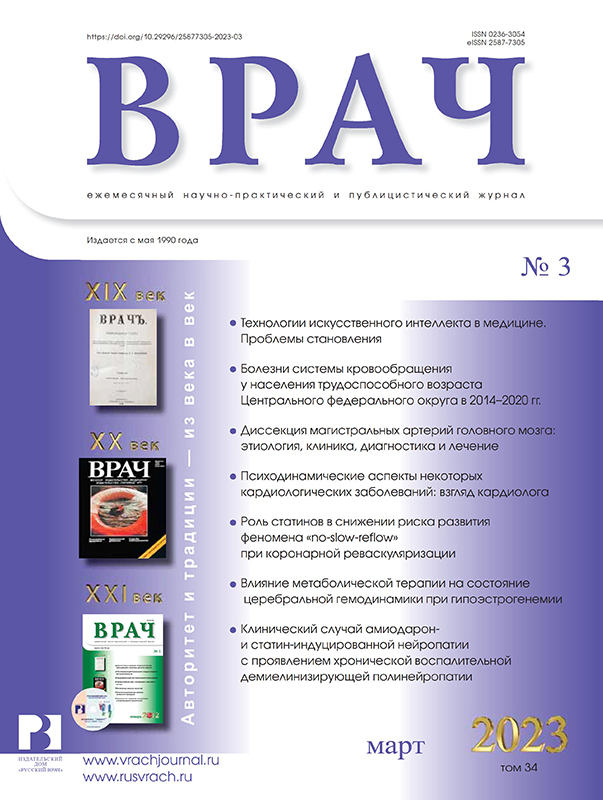Artificial intelligence technologies in medicine. Problems of establishment
- Authors: Borodulina E.1, Gribova V.2, Vdoushkina E.1
-
Affiliations:
- Samara State Medical University, Ministry of Health of Russia
- Institute of Automation and Control Processes, Far Eastern Branch, Russian Academy of Sciences
- Issue: Vol 34, No 3 (2023)
- Pages: 5-8
- Section: Topical Subject
- URL: https://journals.eco-vector.com/0236-3054/article/view/352492
- DOI: https://doi.org/10.29296/25877305-2023-03-01
- ID: 352492
Cite item
Abstract
In the period of global digitalization of society and healthcare, special attention is paid to the development of artificial intelligence (AI) technologies in medicine. To date, there are two main approaches to implementing AI technology based on machine learning methods and knowledge. In the former case, datasets are used; in the latter case, there is the knowledge acquired from scientific sources or experts. Each of the methods has both advantages and disadvantages. Medical decision support systems are being actively developed and implemented. But is everything so simple?
Full Text
About the authors
E. Borodulina
Samara State Medical University, Ministry of Health of Russia
Author for correspondence.
Email: borodulinbe@yandex.ru
Professor, MD
Russian Federation, SamaraV. Gribova
Institute of Automation and Control Processes, Far Eastern Branch, Russian Academy of Sciences
Email: borodulinbe@yandex.ru
Corresponding Member of the Russian Academy of Sciences, TechnD
Russian Federation, VladivostokE. Vdoushkina
Samara State Medical University, Ministry of Health of Russia
Email: borodulinbe@yandex.ru
Candidate of Medical Sciences
Russian Federation, SamaraReferences
- Kartskhiya A.A. Digital medicine – todays' reality. Economic and social problems of Russia. 2021; 2: 132–42 (in Russ.). doi: 10.31249/espr/2021.02.08
- Lazareva M.M. Artificial intelligence in the development of new products and applications. Innovacii. Nauka. Obrazovanie. 2022; 49: 1147–50 (in Russ.)
- Gusev A.V., Vladzymyrskyy A.V., Sharova D.E. et al. Evolution of research and development in the field of artificial intelligence technologies for healthcare in the Russian Federation: results of 2021. Digital Diagnostics. 2022; 3 (3): 178–94 (in Russ.). doi: 10.17816/DD107367
- Goldina T.A., Burmistrov V.A., Efimenko I.V. et al. Artificial Intelligence in Healthcare: Real World Data and Patient Voice – Are We Ready for New Realities? Medical Technologies. Assessment and Choice. 2021 2: 22–31 (in Russ.). doi: 10.17116/medtech20214302122
- Rebrova O.Yu., Gusev A.V. Sample size calculation for clinical trials of medical decision support systems with binary outcome. Sovremennye tehnologii v medicine. 2022; 14 (3): 6–14 (in Russ.). doi: 10.17691/stm2022.14.3.01
- Borodulina E. Artificial intelligence in tuberculosis detection. Opportunities and prospects. Vrach. 2020; 31 (5): 30–3 (in Russ.). doi: 10.29296/25877305-2020-06
- Sharova D.E., Garbuk S.V., Vasilyev Yu.A. Artificial intelligence systems in clinical medicine: the world’s first series of national standards. Standards and Quality. 2023; 1: 46–51 (in Russ.). doi: 10.35400/0038-9692-2023-1-304-22
- Borodulina E.A., Gribova V.V., Eremenko E.P. et al. Intelligent service for managing the treatment of patients with pulmonary tuberculosis. Medical doctor and information technologies. 2021; 2: 36–45 (in Russ.). doi: 10.25881/18110193_2021_2_36
- Kopylova O.V., Ershova A.I., Efimova I.A. et al. Electronic medical records and biobanking. Cardiovascular Therapy and Prevention. 2022; 21 (11): 3425 (in Russ.). doi: 10.15829/1728-8800-2022-3425
- Potekaev N.N., Dolya O.V., Frigo N.V. et al. Artificial intelligence in healthcare: general considerations and philosophical aspects. Klinicheskaya Dermatologiya i Venerologiya. 2022; 21 (6): 749–56 (in Russ.). doi: 10.17116/klinderma202221061749
- Sandeep K. Where did IBM go wrong with Watson Health? URL: https://qz.com/2129025/where-did-ibm-go-wrong-with-watson-health
- Shirobokov Ya., Gladunova E., Borodulina E. et al. Time course of changes in the list of drugs for the treatment of COVID-19 in the temporary guidelines. Vrach. 2021; 32 (11): 29–35 (in Russ.). doi: 10.29296/25877305-2021-11-06
- Covid-19 patients symptom dataset. Total of 2575 Covid-19 positive and negative cases patients symptoms. URL: https://www.kaggle.com/datasets/takbiralam/covid19-symptoms-dataset
- Covid patient datasets. The Covid patient datasets dataset is collected by randomly sampling. URL: https://www.kaggle.com/datasets/amirshnll/covid-patient-datasets
- Gribova V.V., Moskalenko Ph.M., Timchenko V.A. et al. The IACPaaS Platform for Developing Systems Based on Ontologies: a Decade of Use. Artificial intelligence and decision making. 2022; 4: 55–65 (in Russ.). doi: 10.14357/20718594220406
- Gusev A.V., Morozov S.P., Kutichev V.A. et al. Legal regulation of artificial intelligence software in healthcare in the Russian Federation. Medical Technologies. Assessment and Choice. 2021; 43 (1): 36–45 (in Russ.). doi: 10.17116/medtech20214301136
- Rebrova O.Yu. Life cycle of decision support systems as medical technologies. Medical doctor and information technologies. 2020; 1: 27–37 (in Russ.). doi: 10.37690/1811-0193-2020-1-27-37
Supplementary files







